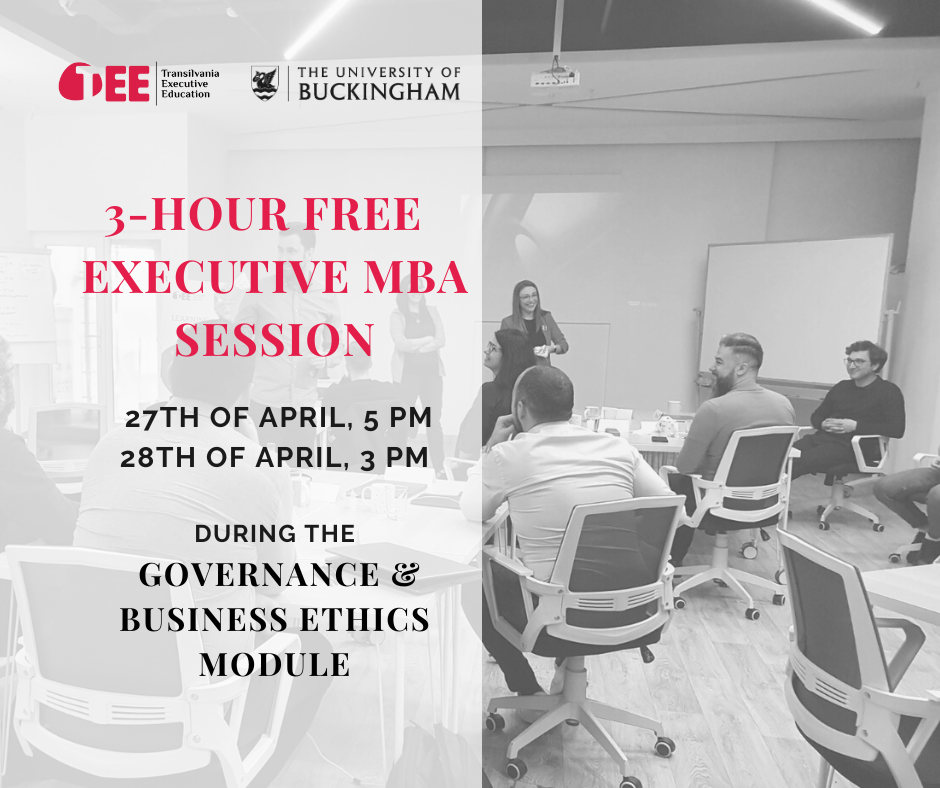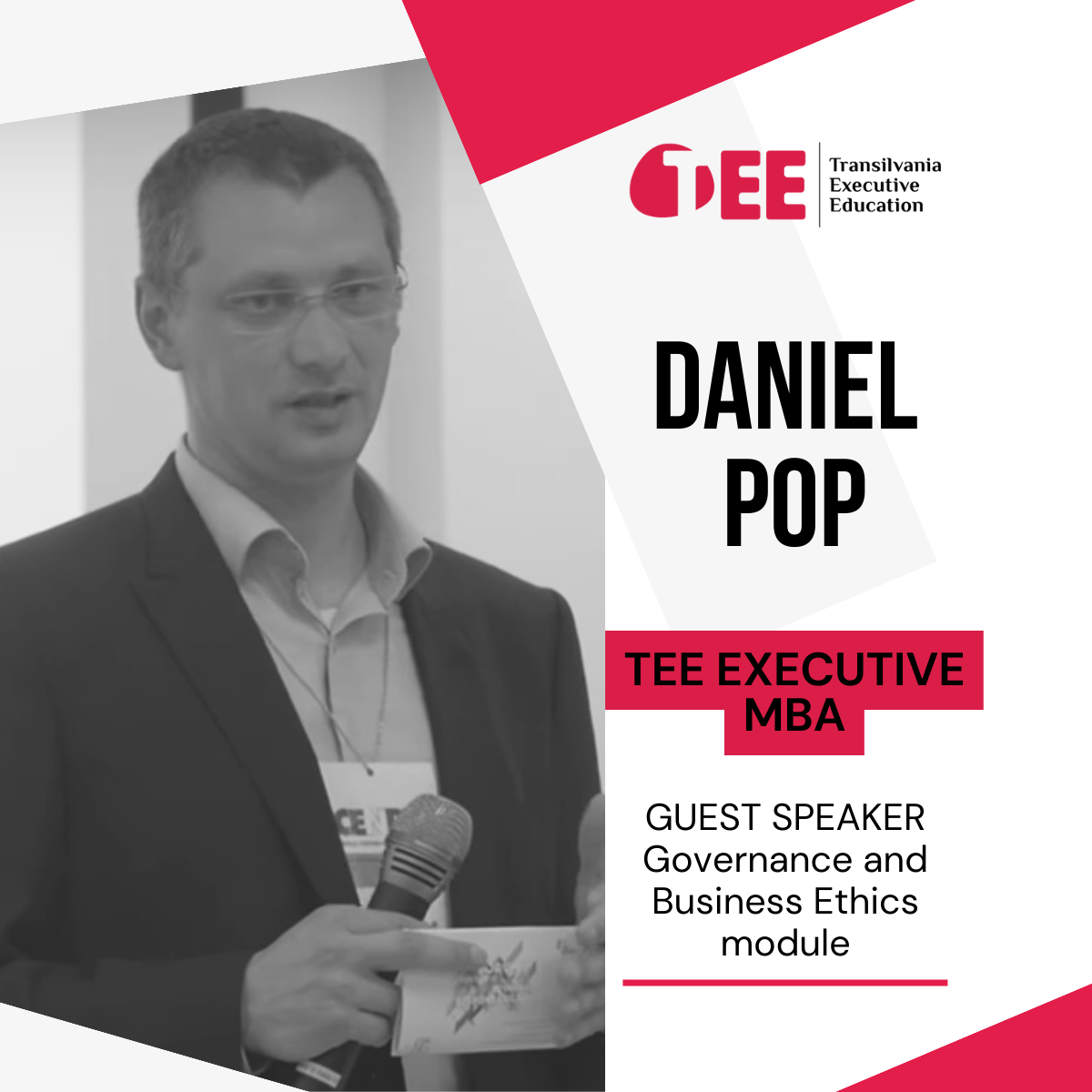The end of April brings a new module for the TEE Executive MBA students - Governance and Business Ethics module led by Professor Cornel Ban, one of the most visible Romanian economists at the international level, and Stine Quorning, as guest lecturer, from Copenhagen Business School. The 4-days module will give students the opportunity to critically analyse the political economy of the opportunities and constraints of business in areas as diverse as finance, sustainability, labor or trade.

Let us know via our email -
What is this module about?
Governance & Business Ethics, the 11th module of the TEE Executive MBA programme, is built in such a way to help students develop an understanding of how businesses are agents and subjects in the global governance system.
As they explore the most important trends that impact the global economy (trade governance, financial regulations, digitalisation and the transition to a green economy), students are expected to gain a better understanding of the trends in political economy, and will be able to identify the opportunities and potential constraints for the work environment or business they are present in.
This module is being taught between 26th and 29th of April in Cluj-Napoca as part of the TEE Executive MBA validated by Buckingham University.
Who is delivering this module?

Spearheading as module leader is professor Cornel Ban an associate professor of International Political Economy at Copenhagen Business School. Prior to this he was a Reader at City University of London, assistant professor at Boston University and research fellow at Brown University in the United States. He wrote two books and two dozen articles and book chapters on the politics of economic expertise, policy shifts in international financial institutions and the politics of capitalist diversity in Brazil, Spain, Hungary and Romania. His book Ruling Ideas: How Neoliberalism Goes Local, Oxford University Press, 2016 received the Political Economy Award for 2017 of the British International Studies Association. Currently, Cornel works on growth regimes, the role of state and finance in decarbonization and the political economy of industrial policy.
“It is a fantastic opportunity to work together in the TEE EMBA Governance module. The key idea is to walk through how markets are organized nationally and transnationally. After a brief overview what global economic organizations do, we will practice these insights on (a) the dilemmas raised by the green transition in the age of geopolitical competition and industrial policy assertiveness and (b) a diagnosis of the strengths and weaknesses of the Romanian growth model and variety of capitalism in the light of competing alternatives.” - declares Cornel Ban.
Don’t forget to register for 3-hour free sessions during this module!
Limited spots available, so register today at

Stine Quorning, our guest lecturer for this module, is a Ph.D. fellow at the Department of Organization at Copenhagen Business School.
Stine has an interdisciplinary approach working in the fields of international political economy and economic sociology.
Her primary research interests are in the political economy of central banking and finance, with a focus on green finance and climate-related risks.
In her Ph.D., she explores how central banks started to work with questions related to climate change, and how central bankers with a background as economists have approached the work with climate change, as a field that is outside their area of expertise.
“I am happy to take part in this year’s TEE EMBA Governance module, and host sessions on climate change as a risk, green finance, and central banks. I look forward to meeting you all, and I hope we will have some engaging and insightful discussions during the sessions.” - declares Stine Quorning
Special guests for this module

We are happy to welcome in our community Daniel Pop, a professional with rich experience in the non-profit organization management industry.
Daniel will organise an executive workshop for our community during the module on China’s intervention in green energy policies in Europe and how technologies are not value and culturally neutral.
Daniel Pop serves as Lecturer at the Faculty of Political Science, Public Administration and Communications, at the Babeș-Bolyai University, and as Public Policy Expert at the Technical University of Cluj-Napoca.
Previously, he acted as Educational Advisor at the Open Society Foundations, and President of the Public Policy Centre, in Romania.
He earned his BA in Political Science at Babes-Bolyai University, an M.A. in Public Policy at the Denver University Graduate School of International Studies, and a PhD. in Political Science from the Central European University.
His research interests and publications focus on regulatory governance, welfare markets and public-civil society relations.
Recent publications from teaching staff
Helgadóttir, Oddný, and Cornel Ban. "Managing Macroeconomic Neoliberalism: Capital and the Resilience of the Rational Expectations Assumption since the Great Recession." New Political Economy (2021): 1-16.
Ban, Cornel. "Emergency Keynesianism 2.0: The political economy of fiscal policy in Europe during the Corona Crisis." Samfundsøkonomen 4 (2020): 16-26.
Ban, Cornel, and Dorothee Bohle. "Definancialization, financial repression and policy continuity in East-Central Europe." Review of International Political Economy (2020): 1-24.
Ban, Cornel, and Bryan Patenaude. "The professional politics of the austerity debate: A comparative field analysis of the European Central Bank and the International Monetary Fund." Public administration 97.3 (2019): 530-545.
Stine Quorning (2023): The ‘climate shift’ in central banks: how field arbitrageurs paved the way for climate stress testing, Review of International Political Economy, DOI: 10.1080/09692290.2023.2171470
For more information regarding our teaching staff’s academic activity you can find Cornel Ban here, and Stine Quorning here.


